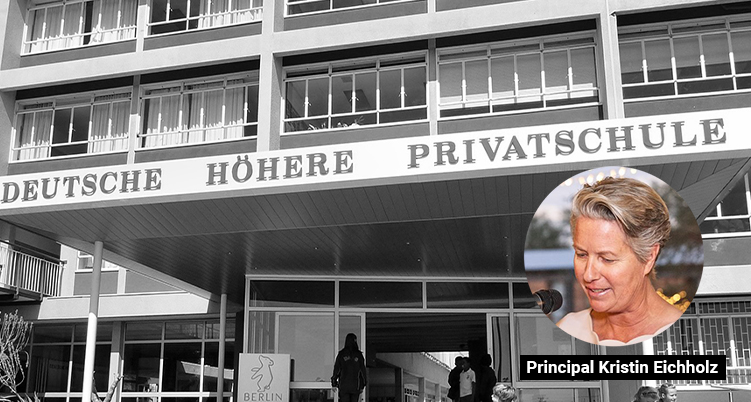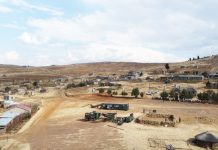By Shinovene Immanuel and Charmaine Ngatjiheue | 10 November 2020
SOME black pupils at one of the top private schools in the country, the Deutsche Höhere Privatschule Windhoek (DHPS), say they face continued racism from peers, amid concerns that the school is downplaying continued incidents of racism and prejudice.
These allegations are contained in a report that summarised a racism and prejudice discussion organised by Grade 11 and 12 pupils’ representatives on 2 July this year.
The report shows that black pupils have raised several race-related issues but the school appears to ignore their concerns.
The school, which currently accommodates 1 185 children, has refused to answer detailed questions sent to the principal, Kristin Eichholz, about the report.
DHPS issued a general statement on Sunday to avoid answering media questions sent to them last week.
“We feel a deep empathy for those that have suffered personal injury as a result, whether physical or emotional. We are not proud that discrimination still happens at school and in our society. It saddens us that there is still a long way to go before we can claim a truly inclusive environment,” the school said in the statement.
The school, co-funded by the German government, also confirmed the report by the pupils.
DOUBLE STANDARDS
In June this year, Eichholz and pupils bent their knees in the street outside their school for eight minutes to sympathise with the Black Lives Matter movement.
However, a month later, DHPS pupils organised themselves to express concerns over racism.
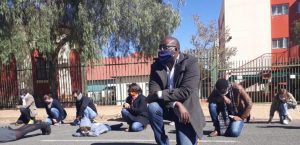
According to the July 2020 report of that discussion, some pupils “experienced being called racial slurs and racial stereotyping such as being called the N (n*gg*rs) or K (k*ff*r) word”. Those two words are offensive and demean black people.
Black pupils are regarded as less intelligent, the report seen by The Namibian showed.
Some white pupils “walk further away from black ones and mutter things like ‘ew’ or pull a face; they remake ‘black accent’ and laugh about it,” the report said.
“In arguments, people have used the threat ‘don’t make me say something racist to you’,” the pupils said.
The report says, if a black student reports a racist incident to school authorities, they are told that the person “didn’t mean it that way” thus invalidating their experience and defending inexcusable behaviour.
“Some teachers excuse racist behaviour, instead of disciplining and educating the perpetrators,” the pupils complained.
Other black pupils are allegedly told that “making noise is a part of your culture”.
In addition, the black students would allegedly be harassed for having colourful braids, while white pupils would get away with colourful dyed hair.
Some pupils said the school system allows for sowing seeds of racism from lower grades.
The school prides itself on accommodating pupils who speak diverse Namibian languages but sources said the German language and culture are often regarded as superior.
For instance, pupils are given a choice to start Grade 1 through two language options: English or German.
Sometimes, pupils are advised to take the German language route because they get better opportunities.
To some pupils, this is one of the root causes of racism at the school.
“From the beginning of our school careers, we are separated. As a result of that, there is a mental separation of ‘English classes’ and ‘German classes’ which leads us pupils to ‘naturally’ segregate,” the children claimed.
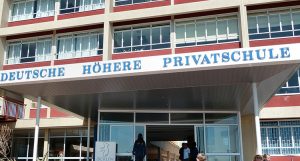
“This has led to lack of communication and the chances of growth where intolerance and prejudice are concerned,” the pupils said.
Another issue highlighted in the report is that teachers, administrators and librarians tend to be nicer to black pupils when they are spoken to in German instead of English.
The school has the option of Cambridge Certificate as well as the Deutsche Internationale Abitur (DIA) qualifications for its pupils.
The black pupils predominantly opt for the Cambridge certificate, and the report alleges that the school authorities then treat them unfairly.
“DIA pupils do not experience the same consequences for not having proper sports uniforms as NSSC/Cambridge pupils do,” the report stated.
The report further claims that black pupils would be ordered to remove the wrong clothing which would then be confiscated.
“Covid-19 rules have been enforced more strictly with black children than whites (this has improved),” the report further states.
The pupils claimed in the report that they should not be scared to face any consequence for standing up to alleged racist teachers. They also asked why the Day of the African Child is not celebrated at the school.
IN DENIAL
DHPS was founded in 1909 – during German colonial rule in Namibia – and the school has been caught up in racism claims over the years. Some former pupils claim that the school is in denial despite frequent complaints.
Four years ago, the school was caught up in a racism controversy after a white mother barred a black Grade 1 boy from attending her daughter’s birthday.
That episode was condemned by the education ministry.
The school then set up a committee called Action Group Encounter or AGE to deal with discrimination and racism. That committee appears to have been ineffective, toothless and undermined because of reluctance by the school.
The school issued a statement yesterday, insisting that all is well, but sources said the move was a sign the school was in denial.
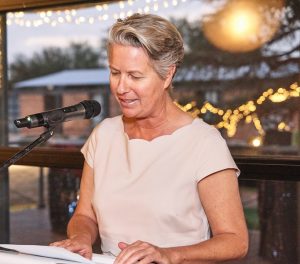
The school’s management said it opposes any form of discrimination.
They acknowledged the historic prejudices as well as the “resultant inequality created”.
The management admitted that there might be “discrimination” among pupils: “whether unintentional or even borne out of a lack of education or understanding”.
According to the school, a position was created within the school management to deal with these incidents of racism as they are reported.
Additionally, this position is tasked with facilitating changes to both the structure and curriculum of the school to favour inclusion.
The school said it established an action group consisting of members of the board, management, staff, pupils and parents five years ago to address “discrimination” in an open and honest way.
“Dedicated learners with some of their teachers have initiated a dialogue among the learners with regards to discrimination: racism and prejudice in particular. The initial targeted group was Grade 11 and 12 learners as they were the only ones at school during that period,” the school noted.
The school said in its statement that the “discrimination incidents” were dealt with according to its code of conduct along with an exhaustive investigation, after being reported. Some cases date as far as six years ago.
“The school has and will continue to facilitate sensitivity training for staff and learners alike to eliminate hurt caused by a lack of knowledge and awareness,” the management said.

